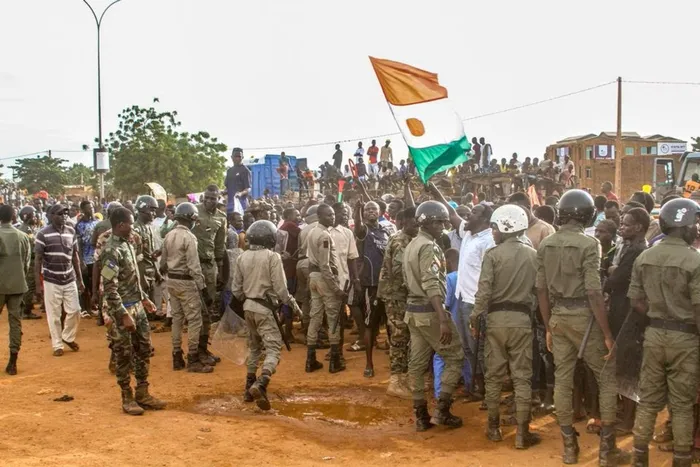Niger: coup leaders to put deposed president on trial for treason

Picture: ANA – The junta appears to be entrenching itself, naming a new government last week and staging rallies in shows of defiance across the country, the writer says.
By Rick Noack
Mohamed Bazoum, the deposed president of Niger, may face treason charges, the junta that unseated him last month announced, marking a new escalation in tensions with neighbouring countries that are pondering military action against the coup leaders.
A military intervention would put hundreds of Western soldiers, including US and French troops who are based in Niger to assist in combating regional militant groups, at risk of being caught in the middle.
In his statement Sunday night, the junta spokesperson, Colonel Major Amadou Abdramane accused Bazoum of “high treason” and of “undermining the internal and external security of Niger” – charges that could carry the death penalty.
Abdramane said the gathered “necessary evidence” could be used to prosecute Bazoum “before competent national and international authorities”.
A spokesperson for the United Nations called the junta announcement a “very worrying declaration,” adding that the world body is “extremely concerned about the state of being, the health and safety of the president and his family”. The State Department called it an “unwarranted and unjustified” move.
The announcement may have further limited the options for the United States, France and regional powers to negotiate a solution in hopes of restoring the status quo before the military coup. “They're trying to make it very clear that Bazoum coming back to power is unacceptable to them,” said Andrew Lebovich, a research fellow at the Dutch Clingendael Institute, adding that the announcement also suggests that the junta is “using him as a bargaining chip”.
Ecowas, the regional bloc of countries that has threatened military action against the coup leaders over the past weeks, expressed “stupefaction” in response to the possible charges. Calling for the release and reinstatement of the democratically elected Bazoum, the organisation said the junta's threat of charges “represents yet another form of provocation”.
The Associated Press reported last week that Niger's coup leaders in private conversations with Western officials threatened to kill Bazoum, who is being held in a basement of his residence, in the event of a military intervention.
Ecowas had first threatened such an intervention in the immediate aftermath of the coup, imposing a one-week deadline on the Nigerien junta to restore Bazoum to office. But that deadline passed last week with no signs of military action.
Ecowas reiterated its warnings after an emergency summit Thursday, saying that the bloc was mobilising a standby military force, but it did not provide a timeline or specifics for a possible military intervention.
The situation in Niger was also the subject of a meeting that convened representatives of the African Union on Monday.
The Nigerien junta's public and private comments on Bazoum's future appear to underline its confidence that a military intervention remains a slim possibility, amid disagreements in Western and in West African capitals over the best path forward. Talks between US officials and the junta appear to have produced few tangible results so far.
But the frequency of talks between the international community and the Nigerien junta has surprised some observers. Only hours before the possible charges against Bazoum were announced Sunday night, a religious delegation visiting from neighbouring Nigeria put out a statement that raised hopes for de-escalation, saying that the junta had shown a willingness to engage diplomatically.
Both sides may have an interest in continuing talks. “Even if executed perfectly, a military intervention would be very risky and probably involve significant loss of life,” Lebovich said.
Meanwhile, the junta appears to be entrenching itself, naming a new government last week and staging rallies in shows of defiance.
Sunday's announcement may have been part of that pattern, Lebovich said. “They have moved very quickly, implanting themselves and changing the face of the institutions,” he said, adding that the junta had not only replaced the top leadership but also moved to take over state-operated industries in the country of around 25 million people.
Rick Noack is The Washington Post's Afghanistan bureau chief. Previously at The Post, he was the Paris correspondent, covering France and Europe, and an international affairs reporter based in Berlin, London and Washington.
This article was first published in The Washington Post
Related Topics: